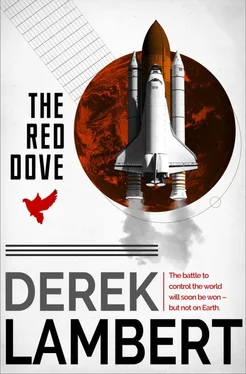‘Not just now, thanks.’
‘We have nearly an hour till dinner…’
Three-quarters of an hour till I make my move. ‘Just a mineral water,’ he said.
‘Before I went to New York I thought all Americans liked hard liquor.’
‘And afterwards?’
‘I found out I was right.’ She picked up the phone and called room-service; miraculously she was put through immediately. She ordered a bottle of Narzan and tea for herself.
He offered her his pack of Marlborough; she took a cigarette and, when he had lit it for her, puffed out small jets of smoke without inhaling them. She should have been languorously smoking a Balkan Sobrani in a holder!
She sat down again. The legs again. He concentrated on Rosa. The saying from the Camp Peary agent’s college was wrong.
A waiter brought the tea and mineral water and departed.
She poured herself tea, and said: ‘Having lived in both American and Russian environments gives me an advantage. I know what’s good and what’s bad about both. Here we have bureacracy gone crazy, shortages, five-year plans that never materialise, a certain uniformity.’ Perhaps the room wasn’t bugged; then again perhaps she was permitted indiscretions to elicit indiscretions. ‘In the West you have riots, violence, unemployment and smog.’
He wanted to say: ‘And freedom,’ but, if the room was bugged, that wouldn’t help his cause. Instead he said: ‘An interesting equation.’
‘What do you do for a living, Mr Massey?’
‘You mean you don’t know?’
She smiled conspiratorially. ‘Well, I have you down as pilot, retired. But you look too young to be retired.’
He made a performance of looking at his watch. ‘Well, if we’re not going to be late for dinner…’
‘We still have half an hour.’
‘I have to change.’
She shrugged. Put down her cup and saucer. At the door her breasts brushed against his chest. He smelled her perfume. Rosa. The college axiom was wrong.
She said: ‘Perhaps after dinner—’
‘Perhaps,’ closing the door behind her.
Twenty minutes later he put on his sheepskin jacket containing the microfilms sewn into the lapels, and made his way to the elevator doors. His step was springy, a man with a cause.
In the cavernous lobby a swarm of tourists from Cuba had just arrived. ‘You always know where to find them,’ his political adviser had told him. ‘At the end of the line-up in the worst restaurants in town. Ivan doesn’t have much respect for Cubans, much better to be an American in Moscow.’
Massey thought he sported Natasha Uskova across the lobby but he couldn’t be sure. He pushed his way through the Cubans, past tottering piles of luggage. As more Cubans came through the doors he squeezed between them. Outside it was snowing lightly; the snow in front of the doors had been trampled into cobblestones of white ice, beyond it was thick and soft.
Massey glanced behind him. More Cubans. He climbed into a battered black taxi and told the driver to take him to the Metropole Hotel; there were certain destinations, he had been advised, that taxi drivers didn’t question, or report.
As the cab swung away from the hotel a white Lada 2105 parked by the kerb took off. It was still behind the cab at Arbatskays Square.
As they drove along Kalinina Prospect, Massey caught a glimpse through the falling snow of the illuminated red star on the spire of St Saviour’s Tower overlooking Red Square. He told the driver to stop. Startled, the driver braked and the cab skidded to a halt. The white Lada sailed past, stopping farther along the avenue of high rise.
Massey stuffed some rouble notes in the driver’s hand and ran towards it. The taxi began to follow; then accelerated away throwing up slush.
Massey yanked open the door of the Lada. ‘Good evening, Bob,’ said Herr Brasack, ‘I have a message for you from Mr Reynolds.’
After the first pulse of shock Massey thought: ‘Anyone could get hold of Reynolds’ name.’ He began: ‘Who—’ but Brasack interrupted: ‘No time for questions, Bob. How about 512 937 2621?’
It was the Padre Island National Seashore phone number, agreed in Washington as identification.
Massey asked: ‘What do you want?’ peering inside the car.
‘Just making contact. We wanted you to know that you weren’t alone.’
‘Protected by an East German?’
‘That’s the way it’s done, Bob.’ Brasack’s voice was still friendly but now it had a cutting edge to it. ‘The Company can’t rely on Embassy operatives. Too obvious. So they farm out the work to foreigners like me. East German journalist. What could be better?’
‘What was the message from Reynolds?’
‘A quotation. All this and heaven too. Mean anything to you?’
Massey nodded: for heaven read space.
Brasack leaned across and grasped the door handle. ‘I’ve got to be going now, Bob; it doesn’t pay to hang around in Moscow. Are you making your move now?’ he asked abruptly.
‘On schedule,’ Massey said. He shut the door and walked briskly away. On schedule but with a change in plan; he saw no point in telling Brasack that, instead of defecting at the Soviet Foreign Ministry, he had decided to go straight to the altar of intrigue, No. 2 Dzerzhinsky Square.
The spool of tape was labelled ROBERT MASSEY. POLYGRAPH INTERROGATION BY YAROSLAV DRABKIN. NOV. 14, 1983.
Vlasov pressed the white ON button on the console recorder built into the wall and, elbows on his desk, fingertips to his fragile-looking temples, listened.
At first trivialities.
Then: ‘When did you decide to defect?’
A pause. ‘A long time ago, I guess.’
Q: How long?
A: When I was ill.
Q: When you were crazy?
A: No, ill.
A splice of fresh tape had been inserted at this point for a comment by Yaroslav Drabkin. ‘The question was deliberately brutal to discover whether subject had been trained to deceive the polygraph. Such brutality would have produced extreme pulse, blood pressure and sweat reaction in a genuine subject, minimal reaction in a subject coached to control emotions.’
A pause. Drabkin clearing his throat.
‘Well?’ Yuri Peslyak who was sitting opposite Vlasov, addressed the recorder.
‘The subject’s reactions were extreme.’
Q: Why did it take you so long to implement your decision?
A: Because I was sick. At least I thought I was.
Q: Please explain.
A: The Central Intelligence Agency shot me full of drugs to make everyone think I was crazy. Me included.
Q: Why did they do that, Mr Massey?’
A: So that no one would take me seriously.
Q: Are you sane?
A: As sane as that machine of yours.
Q: Why have you defected?
A: Think about it, Mr Polygraph. Think what they did to me.
Q: They?
A: America.
Q: So your motives changed?
A: I guess so. The first time I was… disorientated. Space can do that to you. I wanted to share…. Now I hate.
Q: How did you discover you had been drugged?
A: A psychiatrist at the Company clinic in Washington suddenly got guilty. He was dying of cancer. Said he didn’t want to meet his Maker with me on his conscience.
Q: You realise we can check this out?
A: Not him, you can’t – he’s dead.
Q: Who did you speak to in the white car?
A pause.
Vlasov said: ‘This Drabkin, he’s good.’
‘The best,’ Peslyak agreed. ‘Married to his lie detector. I sometimes wonder how he would react under interrogation. If he lied to his machine it would be like lying to himself.’
‘We all do that from time to time,’ Vlasov said.
A: What white car?
Q: The white car that stopped in front of your taxi two nights ago.
Читать дальше
Конец ознакомительного отрывка
Купить книгу












